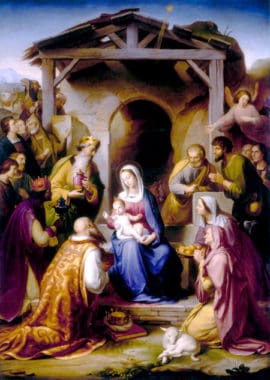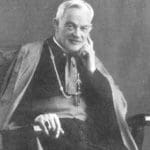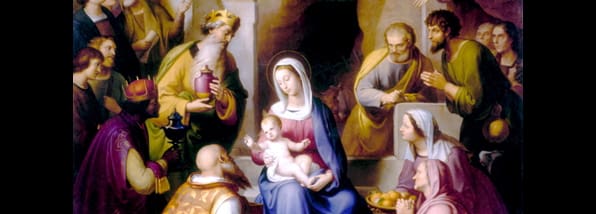THE ADORATION OF THE MAGI
“And when they had heard the King they went their way, and behold, the star which they had seen in the East went before them, until it came and stood over where the Child was. And seeing the star they rejoiced with great joy. And going into the house they found the Child with Mary his Mother, and falling down they adored him; and opening their treasures they offered to him gifts, gold, frankincense and myrrh.”
Matthew 2:9-11
1. There is an astonishing simplicity about these Wise Men from the East. They trust the blind guidance of a star; they entrust themselves to an unknown people in Jerusalem; they trust a King whose reputation for treachery is notorious; they go again on their way full of trust; and they are rewarded first by the revived guidance of the star, and then by the fulfillment of all their best hopes. It is the way of God; there are some virtues in whose exercise He seems to take special delight; and to secure this He will play with His children. Among them conspicuous are faith, and hope, and charity. He will make things appear impossible that they may assert their faith the more; He will darken the way that they may the more emphasize their hope; He will take Himself away, that they may appeal the more vehemently in love. But “He is faithful”; and to such as He tries He gives the power to respond, and to such as respond He gives the guiding star and Himself.
 2. “Seeing the star they rejoiced with great joy.” The words obviously imply that the days in Jerusalem had been painful days, days of darkness and trial, perhaps even of ridicule and insult. The King, it is true, had treated them with a show of interest; but the attitude of the rest, from the mere fact that none cared to go with them to act even as a guide, seems to show some contempt and opposition. But now their joy returned, and soon it was complete. “And entering into the house”–thank God, we say, it was now a house, and no longer the cold cave–“they found the young Child, with Mary his Mother.” It is remarkable that St. Matthew should so emphasize the Mother, and should even add her name, Mary. Would not “they found the Child” have been enough? Would not “they found the Child and His Mother” have been enough? This little word alone shows us that St. Matthew was no less devoted to that Mother than was St. Luke or St. John.
2. “Seeing the star they rejoiced with great joy.” The words obviously imply that the days in Jerusalem had been painful days, days of darkness and trial, perhaps even of ridicule and insult. The King, it is true, had treated them with a show of interest; but the attitude of the rest, from the mere fact that none cared to go with them to act even as a guide, seems to show some contempt and opposition. But now their joy returned, and soon it was complete. “And entering into the house”–thank God, we say, it was now a house, and no longer the cold cave–“they found the young Child, with Mary his Mother.” It is remarkable that St. Matthew should so emphasize the Mother, and should even add her name, Mary. Would not “they found the Child” have been enough? Would not “they found the Child and His Mother” have been enough? This little word alone shows us that St. Matthew was no less devoted to that Mother than was St. Luke or St. John.
3. The Gentile Church has always dwelt upon the scene which follows. So deeply did it in the early days associate itself with this act of adoration that the feast of the Epiphany was held with greater pomp than the feast of Christmas; even until now its octave is in one sense of greater rank, and there are parts of England where it is still called “Old Christmas Day.” “They adored Him,” acknowledging Him as the King Whom they sought. Did they know Him to be also God? They offered Him the best that they had; the tiny offering signified their desire to give Him all; nothing in their eyes was too good, nothing should be kept back. This is enough; when we speak of such worshipers believing our Lord to be God we know not what we say. He was the One; He was the Master of the stars; He was worthy of all worship; what need we more?
Summary Meditation Points:
- The simple confidence of the reward of the Magi met with its reward of consolation.
- The consolation was found, first in the guidance from Heaven, then in the finding of “the Child, with Mary, his Mother.”
- Their adoration begins the unending adoration of the nations.
 Editor’s Note: This meditation is from Archbishop Alban Goodier’s “The Prince of Peace” (1913).
Editor’s Note: This meditation is from Archbishop Alban Goodier’s “The Prince of Peace” (1913).
Art: Geburt Christi (The Birth of Christ, also known as The Nativity), Franz von Rohden, 1853, Restored Traditions, used with permission. Archbishop Alban Goodier, S.J., www.stmaryscadoganstreet.co.uk, all rights reserved, used with permission.





